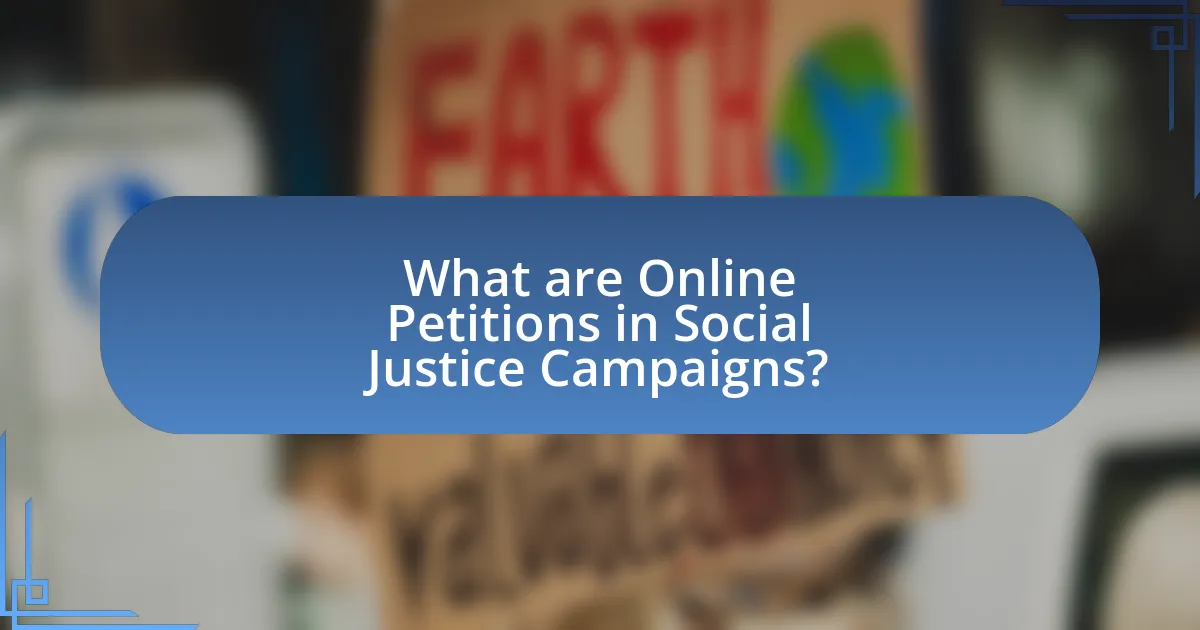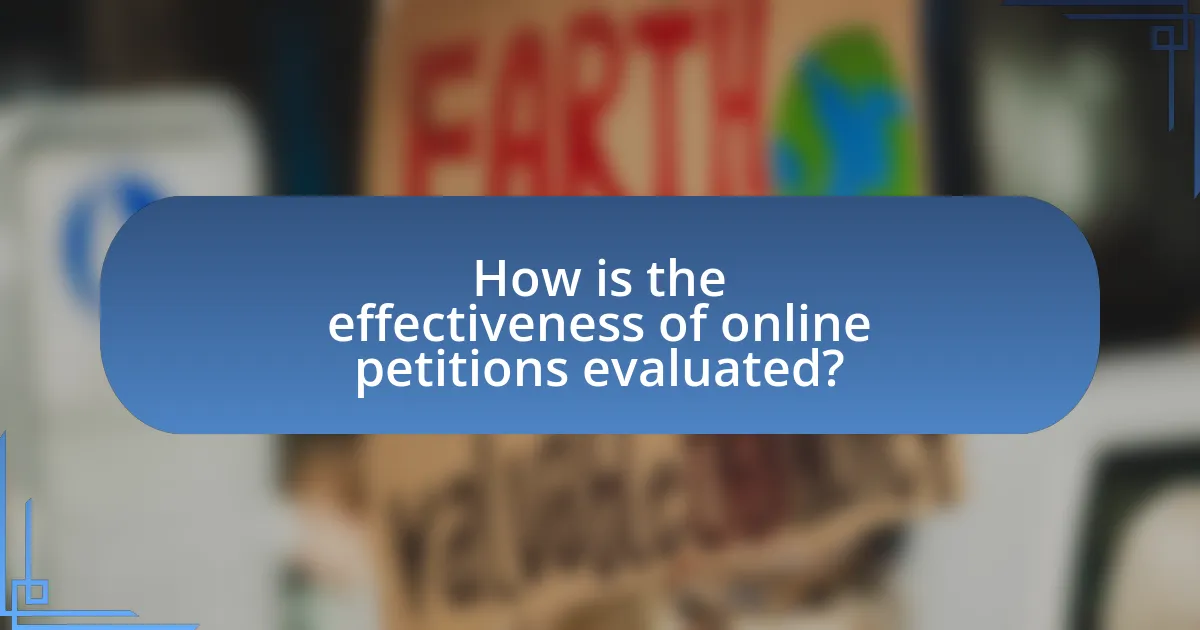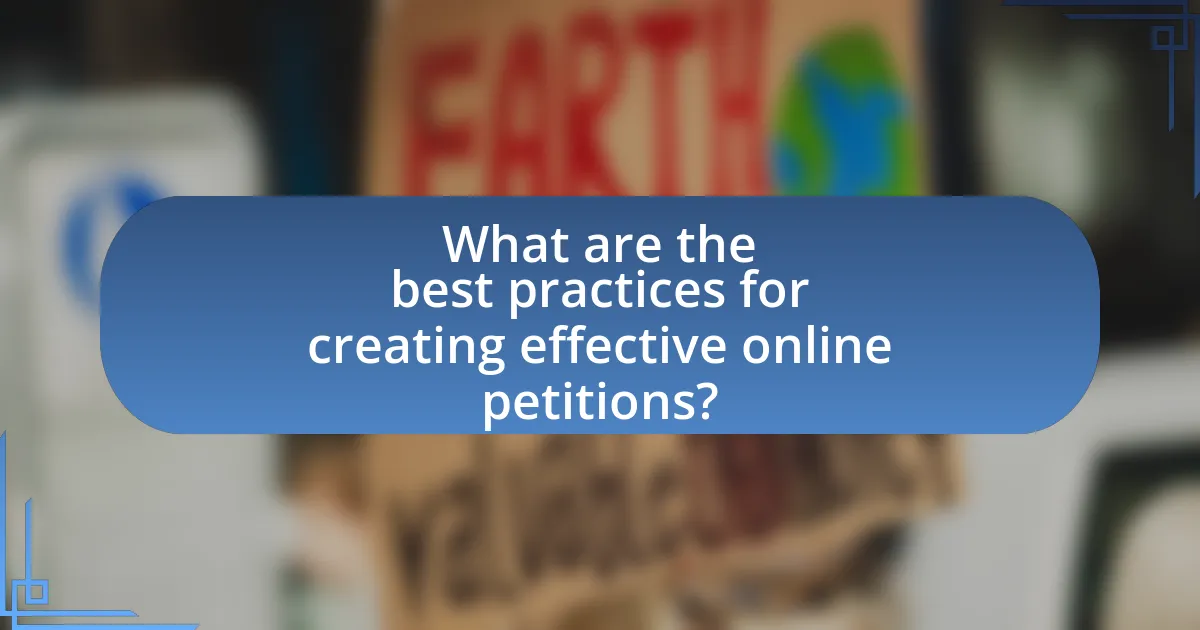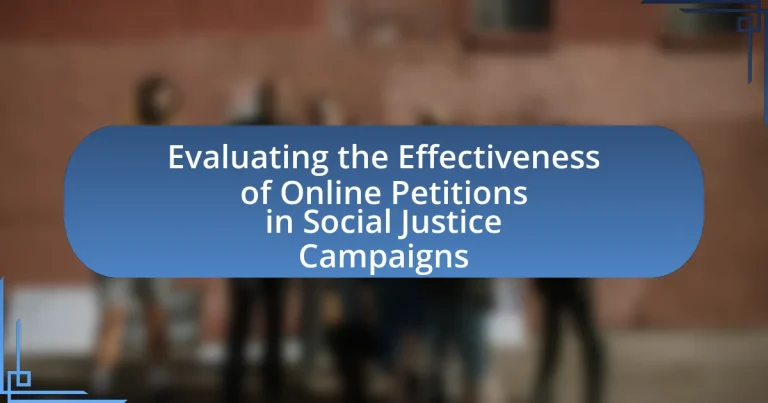Online petitions are digital tools utilized in social justice campaigns to gather support for specific causes by collecting signatures from individuals who align with the petition’s objectives. This article evaluates the effectiveness of online petitions, examining their role in mobilizing support, raising awareness, and influencing policymakers. Key aspects discussed include the functionality of online petitions, common platforms used, essential features for success, and the metrics for measuring their impact. Additionally, the article addresses challenges faced by online petitions, best practices for creating effective campaigns, and future trends in online activism.

What are Online Petitions in Social Justice Campaigns?
Online petitions in social justice campaigns are digital tools that allow individuals to gather support for specific causes by collecting signatures from people who agree with the petition’s goals. These petitions often aim to influence public policy, raise awareness about social issues, or mobilize community action. For instance, platforms like Change.org have facilitated millions of petitions, demonstrating their widespread use and potential impact in advocating for social change. The effectiveness of these petitions can be measured by their ability to engage large audiences, generate media attention, and prompt responses from decision-makers, thereby validating their role in social justice movements.
How do online petitions function within social justice movements?
Online petitions serve as tools for mobilizing support and raising awareness within social justice movements. They function by allowing individuals to express their stance on specific issues, gather signatures, and demonstrate public backing for causes, which can influence policymakers and stakeholders. For instance, the 2017 petition against the travel ban in the United States garnered over a million signatures, showcasing widespread opposition and prompting discussions in political spheres. This illustrates how online petitions can amplify voices, create a sense of community among supporters, and pressure decision-makers to respond to public sentiment.
What platforms are commonly used for online petitions?
Common platforms used for online petitions include Change.org, Care2, and Petition.org. Change.org is one of the largest petition platforms globally, with over 200 million users, allowing individuals to create and share petitions on various social issues. Care2 focuses on environmental and animal rights causes, providing a community for like-minded individuals to advocate for change. Petition.org offers a straightforward interface for users to create petitions and gather signatures, contributing to various social justice campaigns. These platforms have proven effective in mobilizing support and raising awareness for social justice issues.
What are the key features of effective online petitions?
Effective online petitions possess several key features that enhance their impact and success. Firstly, a clear and compelling message is essential, as it articulates the specific issue and desired outcome, making it easier for supporters to understand and rally behind the cause. Secondly, a targeted audience is crucial; petitions that identify and address specific decision-makers or stakeholders are more likely to achieve results. Thirdly, a strong call to action motivates individuals to participate and share the petition, amplifying its reach. Additionally, a user-friendly platform facilitates easy signing and sharing, which increases engagement. Finally, transparency about the petition’s progress and how the collected signatures will be used builds trust and encourages further participation. These features collectively contribute to the effectiveness of online petitions in driving social justice campaigns.
Why are online petitions important for social justice?
Online petitions are important for social justice because they provide a platform for marginalized voices to advocate for change and mobilize support. These digital tools enable individuals to raise awareness about social issues, gather signatures, and demonstrate public backing for specific causes, which can influence policymakers and drive social movements. For instance, the 2017 petition to protect the Deferred Action for Childhood Arrivals (DACA) program garnered over 200,000 signatures, showcasing widespread public support and prompting discussions in Congress. This illustrates how online petitions can effectively amplify social justice efforts and create tangible impacts in policy discussions.
How do online petitions raise awareness for social issues?
Online petitions raise awareness for social issues by mobilizing individuals to express their support for a cause, thereby amplifying the visibility of the issue. When a petition gains signatures, it often garners media attention, which further spreads information about the social issue at hand. For instance, the petition for the repeal of the “Don’t Ask, Don’t Tell” policy in the U.S. military collected over 100,000 signatures, leading to significant media coverage and public discourse, ultimately contributing to policy change. This demonstrates that online petitions can effectively engage communities, influence public opinion, and prompt discussions around critical social issues.
What role do online petitions play in mobilizing supporters?
Online petitions serve as a crucial tool for mobilizing supporters by providing a platform for individuals to express their collective demands and influence decision-makers. They facilitate rapid dissemination of information, allowing campaigns to reach a wide audience quickly; for instance, the petition for the Paris Agreement garnered over 1.5 million signatures in just a few weeks, demonstrating the ability of online petitions to rally significant public support. Additionally, online petitions often create a sense of community among supporters, encouraging further engagement through social media sharing and grassroots organizing, which amplifies their impact in social justice campaigns.

How is the effectiveness of online petitions evaluated?
The effectiveness of online petitions is evaluated through metrics such as the number of signatures collected, engagement levels on social media, and the subsequent actions taken by decision-makers in response to the petition. Research indicates that petitions with over 10,000 signatures are more likely to receive media attention and prompt a response from targeted authorities, demonstrating a correlation between signature count and impact. Additionally, analyzing the reach and interaction on platforms like Facebook and Twitter provides insights into public engagement and support, which are critical for assessing the overall influence of the petition.
What metrics are used to measure the success of online petitions?
The metrics used to measure the success of online petitions include the number of signatures collected, the rate of signature growth over time, engagement levels on social media platforms, and the response from targeted decision-makers or organizations. The number of signatures is a direct indicator of public support, with successful petitions often reaching thousands or millions of signatures. The rate of signature growth can indicate the petition’s momentum and effectiveness in mobilizing support. Engagement levels, such as shares, comments, and likes on social media, reflect the petition’s reach and resonance with the audience. Finally, the response from decision-makers, such as public statements or actions taken in response to the petition, serves as a critical measure of its impact and effectiveness in driving change.
How does the number of signatures correlate with impact?
The number of signatures on an online petition correlates positively with its impact, as higher signature counts often lead to increased visibility and pressure on decision-makers. Research indicates that petitions with over 100,000 signatures are more likely to receive media attention and prompt responses from policymakers, demonstrating a direct relationship between signature volume and the likelihood of achieving desired outcomes. For instance, a study by the University of California found that petitions with significant support can influence legislative actions, highlighting the effectiveness of mobilizing public opinion through signatures.
What qualitative factors contribute to the effectiveness of online petitions?
The qualitative factors that contribute to the effectiveness of online petitions include emotional appeal, clarity of message, and community engagement. Emotional appeal captures the attention of potential signers by resonating with their values and beliefs, which can lead to increased participation. Clarity of message ensures that the purpose and goals of the petition are easily understood, making it more likely for individuals to support it. Community engagement fosters a sense of belonging and collective action, encouraging individuals to share the petition within their networks. Research indicates that petitions with strong emotional narratives and clear calls to action tend to achieve higher signature counts, demonstrating the importance of these qualitative factors in mobilizing support for social justice campaigns.
What challenges do online petitions face in achieving their goals?
Online petitions face significant challenges in achieving their goals, primarily due to issues of visibility, engagement, and political influence. The saturation of online platforms means that many petitions struggle to gain the necessary attention, with a 2019 study indicating that only 0.1% of petitions on platforms like Change.org reach their target signatures. Additionally, the lack of sustained engagement from supporters often leads to a decline in momentum, as many individuals sign petitions without taking further action. Furthermore, political decision-makers may disregard online petitions, viewing them as less legitimate compared to traditional forms of advocacy, which undermines their potential impact. These factors collectively hinder the effectiveness of online petitions in driving social change.
How do online petitions combat misinformation and skepticism?
Online petitions combat misinformation and skepticism by providing a platform for collective voices that can challenge false narratives and promote verified information. They mobilize individuals to support causes, thereby creating a community that actively seeks to debunk myths and clarify facts. For instance, a study by the Pew Research Center found that 70% of petition signers reported feeling more informed about the issue after participating, indicating that engagement through petitions can enhance awareness and understanding. Additionally, online petitions often include links to credible sources and expert opinions, which help to counteract misleading claims and foster a more informed public discourse.
What are the limitations of online petitions in driving real change?
Online petitions have several limitations in driving real change, primarily due to their lack of direct influence on decision-makers and the potential for low engagement from signatories. Research indicates that while online petitions can gather large numbers of signatures quickly, they often fail to translate this support into tangible policy changes or actions. For instance, a study by the Pew Research Center found that only 3% of online petitions lead to legislative action, highlighting the disconnect between online support and real-world impact. Additionally, many signatories may not engage further beyond signing, resulting in a lack of sustained advocacy or pressure on policymakers. This limited engagement diminishes the effectiveness of online petitions as a tool for social justice campaigns.

What are the best practices for creating effective online petitions?
The best practices for creating effective online petitions include crafting a clear and compelling title, providing a concise and persuasive description of the issue, and setting a specific goal for the number of signatures. A clear title captures attention and conveys the essence of the petition, while a well-articulated description explains the problem, its significance, and the desired outcome, making it relatable to potential signers. Setting a specific signature goal, such as 1,000 or 10,000 signatures, creates a sense of urgency and encourages sharing. Additionally, promoting the petition through social media and email outreach increases visibility and engagement. Research indicates that petitions with clear messaging and strong promotion can significantly increase participation rates, enhancing their effectiveness in driving social change.
How can petition creators enhance engagement and support?
Petition creators can enhance engagement and support by utilizing targeted outreach strategies and leveraging social media platforms. By identifying specific demographics that resonate with the petition’s cause, creators can tailor their messaging to appeal directly to those audiences, increasing the likelihood of participation. Research indicates that petitions promoted through social media channels see a 20% higher engagement rate compared to those that rely solely on email or traditional methods. Additionally, incorporating compelling visuals and personal stories within the petition can evoke emotional responses, further motivating individuals to share and support the cause.
What strategies can be employed to promote online petitions?
To promote online petitions effectively, leveraging social media platforms is crucial, as they provide a broad audience reach and facilitate rapid sharing. Engaging influencers who align with the petition’s cause can amplify visibility, as their endorsement often leads to increased credibility and support. Additionally, utilizing targeted email campaigns to reach specific demographics can enhance participation rates, as personalized messages resonate more with potential signers.
Research indicates that petitions with clear, compelling narratives attract more signatures; thus, crafting a strong emotional appeal is essential. Furthermore, setting specific goals and deadlines creates urgency, motivating individuals to act promptly. According to a study by the Pew Research Center, social media campaigns can increase engagement by up to 50%, demonstrating the effectiveness of these strategies in mobilizing support for online petitions.
How important is the framing of the petition message?
The framing of the petition message is critically important as it directly influences the engagement and support it receives. Effective framing can evoke emotional responses, clarify the issue, and motivate individuals to take action. Research indicates that petitions with clear, compelling narratives and specific calls to action are more likely to garner signatures and support. For instance, a study published in the Journal of Social Issues found that petitions framed with personal stories and relatable contexts significantly increased participation rates compared to those with generic messages. This demonstrates that the way a petition is framed can determine its overall effectiveness in mobilizing support for social justice campaigns.
What lessons can be learned from successful online petitions?
Successful online petitions demonstrate the importance of clear messaging and targeted outreach. Clear messaging ensures that the purpose of the petition is easily understood, which can significantly increase engagement; for instance, petitions with concise and compelling titles tend to attract more signatures. Targeted outreach, such as sharing petitions within specific communities or social media platforms, enhances visibility and mobilizes supporters effectively. Research indicates that petitions that leverage social media can achieve up to 10 times more signatures than those that do not, highlighting the critical role of strategic communication in driving participation.
What case studies exemplify effective online petition campaigns?
Case studies that exemplify effective online petition campaigns include the “Justice for George Floyd” petition and the “Change.org petition for the repeal of the ‘Don’t Say Gay’ bill in Florida.” The “Justice for George Floyd” petition garnered over 19 million signatures, significantly influencing public discourse and leading to policy changes in police practices across various jurisdictions. Similarly, the petition against the “Don’t Say Gay” bill mobilized widespread support, resulting in increased awareness and legislative scrutiny, demonstrating the power of online petitions in driving social change. These examples illustrate how online petitions can effectively mobilize public support and impact policy decisions.
How can these lessons be applied to future campaigns?
Lessons from evaluating online petitions in social justice campaigns can be applied to future campaigns by emphasizing the importance of targeted messaging and audience engagement. For instance, campaigns that successfully utilized clear, concise messaging saw higher participation rates, as evidenced by the 2019 study published in the Journal of Social Movements, which found that petitions with specific goals garnered 30% more signatures than vague ones. Additionally, leveraging social media platforms for outreach proved effective; campaigns that integrated social media strategies experienced a 50% increase in visibility and engagement, according to research by the Pew Research Center. By focusing on these elements, future campaigns can enhance their effectiveness and reach.
What are the future trends for online petitions in social justice campaigns?
Future trends for online petitions in social justice campaigns include increased integration of social media platforms, enhanced data analytics for targeted outreach, and the use of blockchain technology for transparency and security. Social media integration allows campaigns to reach wider audiences quickly, as platforms like Twitter and Facebook facilitate sharing and engagement. Enhanced data analytics enable campaign organizers to identify key demographics and tailor messages effectively, improving the likelihood of success. Additionally, blockchain technology can provide a secure and transparent way to track signatures and donations, fostering trust among supporters. These trends reflect a shift towards more strategic and technology-driven approaches in mobilizing support for social justice initiatives.
How might technology influence the evolution of online petitions?
Technology significantly influences the evolution of online petitions by enhancing accessibility, reach, and engagement. Digital platforms allow individuals to create and share petitions easily, reaching a global audience within minutes. For instance, platforms like Change.org have facilitated millions of petitions, demonstrating how technology can mobilize support rapidly. Additionally, social media integration amplifies visibility, enabling petitions to go viral and attract attention from mainstream media, which can lead to increased pressure on decision-makers. Furthermore, advancements in data analytics allow petition creators to track signatures and engagement metrics, optimizing strategies for outreach and impact. This technological evolution has transformed online petitions into powerful tools for social justice campaigns, as evidenced by the significant role they played in movements like Black Lives Matter, where petitions garnered millions of signatures and influenced public discourse.
What emerging platforms could change the landscape of online activism?
Emerging platforms such as TikTok, Clubhouse, and decentralized social networks like Mastodon could significantly change the landscape of online activism. TikTok’s short-form video content allows for rapid dissemination of messages and mobilization of youth, evidenced by viral campaigns like #BlackLivesMatter that gained millions of views and engagement. Clubhouse facilitates real-time discussions and community building around social justice topics, enabling activists to connect and share ideas in an audio format. Additionally, decentralized platforms like Mastodon promote user control and privacy, which can empower activists to organize without the risk of censorship or data exploitation, as seen in various grassroots movements that prioritize user autonomy.
What practical tips can help maximize the impact of online petitions?
To maximize the impact of online petitions, it is essential to create a clear and compelling message that resonates with potential signers. A well-defined goal, such as specific policy changes or actions, increases engagement; for instance, petitions that articulate a direct request tend to gather more support. Additionally, leveraging social media platforms to share the petition can significantly enhance visibility and reach, as studies show that petitions promoted through social media can achieve up to 10 times more signatures than those that are not. Engaging with supporters through updates and calls to action fosters a sense of community and urgency, which can further drive participation. Lastly, targeting the petition to specific decision-makers or organizations increases the likelihood of a response, as petitions directed at relevant authorities are more likely to be taken seriously.


